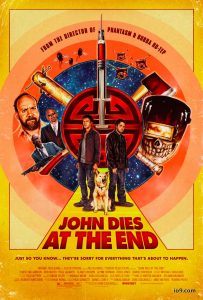 You guys. I am so embarrassed about this right now, and it’s going to be probably the worst review ever, but… I’m like four reviews behind, and at this point I can no longer separate out John Dies at the End the movie from the book that spawned it. At least, not in a meaningful way that I would use to form a discussion about it. In a way, that’s good; I mean, it wasn’t so awful as to make me wonder why they made the movie at all. In another way, it’s certainly bad as it did not transcend its source.
You guys. I am so embarrassed about this right now, and it’s going to be probably the worst review ever, but… I’m like four reviews behind, and at this point I can no longer separate out John Dies at the End the movie from the book that spawned it. At least, not in a meaningful way that I would use to form a discussion about it. In a way, that’s good; I mean, it wasn’t so awful as to make me wonder why they made the movie at all. In another way, it’s certainly bad as it did not transcend its source.
No, you know what? That’s not bad by default, I’m completely wrong about that. It’s great when an adaptation sees into the heart of the source material and creates something new, that part is true. But there’s no shame in making people remember, giving vision to words on a page, and broadening the audience. Which is the thing about this one: I hadn’t read the book in (apparently) six years, so I didn’t remember a lot, but every time some new event occurred[1], it all came right back, and yeah, I can dig that.
The plot is sufficiently strange that I’m not sure it’s worth explaining, except I have a thing that depends upon you knowing a little. See, there’s this drug on the street called Soy Sauce, which gives its users the ability to see through the barriers of time and space. And, okay, that’s pretty awesome, except that some users die horribly or are attacked by the things they can see that nobody else can. Everything else is a spoiler, except you should know that David and John are the two people standing in the way of all of this certain doom.[2]
The point of all of this is that I learned a very important lesson. See, I saw the movie at the Texas Theatre, which is known solely for being where they caught Lee Harvey Oswald, y’know, later that day. It has been somewhat remodeled, and now includes a bar. And the bar had a special related to the movie of the hour, the Soy Sauce Shot. (Which generated the first of the flashback memories I mentioned earlier.) That’s all exciting and fun, right? So we went for it (Jez and I), and… so, um, it was vodka and soy sauce[3]. Cheap vodka. It…. it tasted about like you’d expect. My lesson, if it was not entirely clear, is this: don’t drink a shot made of cheap vodka and soy sauce.
[1] Prime example: the meat monster.
[2] Trust me, it would be certain doom. Also, you may recognize John’s name from somewhere, so I will elaborate that David is the narrator.
[3] The sauce, not the reality-altering drug.
 You guys. I am so embarrassed about this right now, and it’s going to be probably the worst review ever, but… I’m like four reviews behind, and at this point I can no longer separate out
You guys. I am so embarrassed about this right now, and it’s going to be probably the worst review ever, but… I’m like four reviews behind, and at this point I can no longer separate out